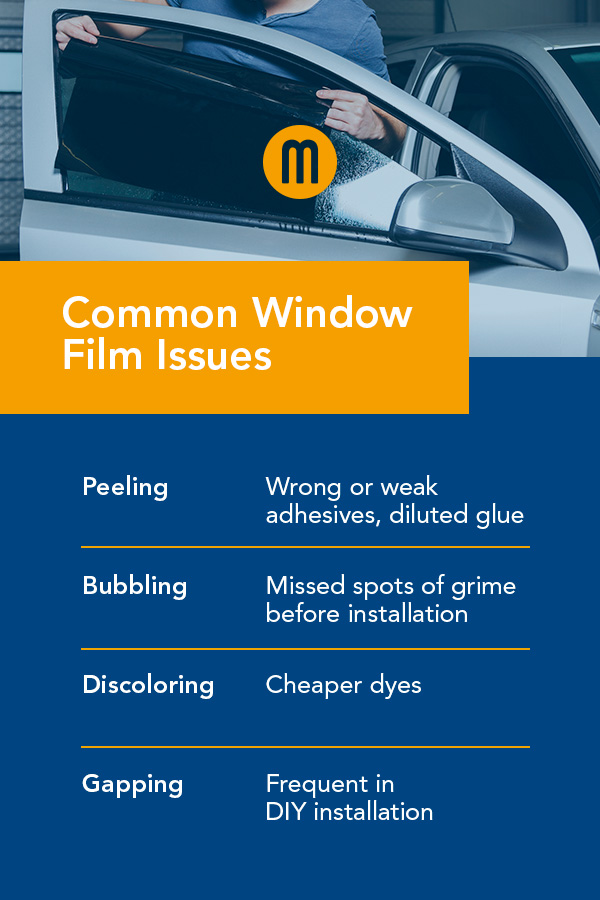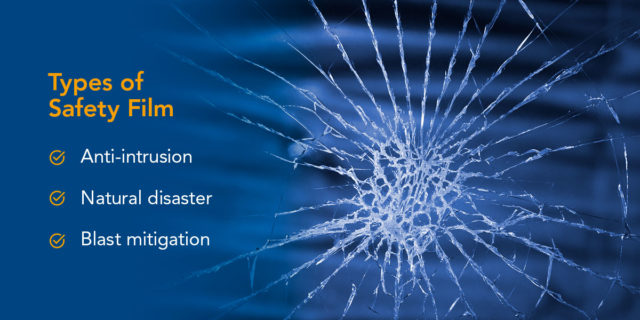Common Window Tint Issues
Sep 12, 2025

By: David Smith
Installing window tint is a great upgrade, whether it’s for your car, home or commercial business. Window tints add a layer of security to your vehicle or residence while also giving it a sharp new appearance. The safety benefits and exciting look offer many benefits for users.
However, applying window film is a careful process — so much so that it’s usually best to get a professional installation. If not, you might encounter various problems with the film. Whether it’s bubbling, peeling or discoloration, many problems might occur with the film after a DIY job.
Here’s an overview of window film and other common car tint problems:
What Is Window Film?
Window tints are sheets of film that get applied to the insides of windows. Window film reduces the amount of radiation and heat from the sun.
As light passes through the window via visible light transmission (VLT), window film filters it by either absorbing, reflecting or transmitting the light. The tint rejects most of the light, preventing many rays from entering the car or building. Depending on the film’s shade, it could reflect anything from 50% to 90% of the rays.
The film also protects components such as your car seats or house furniture from sun damage. Too much exposure to ultraviolet (UV) rays can cause severe skin reactions and fade car interiors. The tints reduce how much sun enters your car or home.
In addition, window film gives users privacy by adding a dark tint to translucent windows. For instance, if you use window film in your car, you can prevent passersby from seeing interior valuables.
While people commonly use window tints in their cars, you can also install them in your home and other areas. Here are three different types of window film:
Automotive
Automotive window film offers protection and attractiveness for your vehicle. You can apply window film to the inside of your windows or the exterior of your car. After installing, the tints give your vehicle both a sleek physical upgrade and increased privacy.
Residential & Commercial
You can also apply window film to the insides of your home windows. Available in many styles, residential window tints offer a safeguard against heat and an attractive accent for your home.
Window tint also serves as an excellent shield for commercial buildings. Whether you work in an office, restaurant or store, commercial window films provide safety and comfort for both you and your customers.
Safety Film
Window film is also available solely for protection. Safety window film keeps shattered glass together, and its high-strength materials are more likely to withstand weather disasters or attempted vandalism.
Common Window Film Issues
Although window film provides many benefits to vehicles, homes and commercial buildings, potential issues can arise during use. Problems with window tint occur even more often with DIY jobs. Many people try to apply window tint themselves to save money, but they often encounter more problems in the long term. That’s why most window tint services highly recommend a professional installation.
These are some common DIY window tinting issues:

Peeling
Peeling after a few years is typical, but when window film peels soon after application, it’s a sign it wasn’t installed properly. Window film usually slides off after glue hardens from exposure. The tint might peel slightly or so much that the entire film falls off.
If you tried to apply the tint yourself, you might have used the wrong or weak adhesives for the tint to stick. Diluted glue can’t hold the film up properly. Instead, it slides off the glass.
On the other hand, you might have tried to install the film when the car wasn’t in the right condition. For instance, if your car’s surface is wet, the tint won’t stick to the adhesive properly. Excessively hot windows might also resist adhesives.
When you get window film professionally installed, it reduces the chance that any peeling will occur.
Bubbling
Bubbles sometimes develop in window film after years of use. If they develop right after installation, though, it’s probably a sign of an issue. In many cases, bubbles form due to exposure to dirt. If you missed a few spots of grime before starting an installation, it could cause the tint to trap the surrounding air and the tint to expand.
Bubbles detract from the window film’s appearance and could cause distractions during driving. Bubbles inhibit light rays and may cause them to distort, impairing your driving ability. It’s best to enlist the help of a professional installer to avoid them appearing in your tint.
Discoloring
Another common DIY window tinting issue is discoloration. Window films are constantly exposed to UV rays and sunlight, and the heat places a lot of stress on the materials. Cheaper dyes start to fade quickly and might develop a purple hue. If your tint starts showing purple tinges, it’s a sign that the dye was either incorrect or not of the best quality.
Tints might also become cloudy or hazy with improper application. This is normally due to a wet car surface during installation. The water becomes trapped under the tint and turns to vapor, clouding the rest of the film. In these cases, you should seek professional assistance — cloudy surfaces prevent you from seeing the road properly and might lead to accidents.
Gapping
If you try to apply window tint yourself, you might find little gaps or uneven spaces after installation. These gaps are frequent in DIY installations. Look for uneven lines around window edges or door handles, which are common spots people miss.
You might have to remove all of the tint and start over to fix these gaps. This is often more costly than seeking an expert application in the first place. Professional tint installers typically use computerized templates to ensure a thorough administration. It’s best to contact a professional for the most thorough window film application.
Temperature Problems
One of the best advantages of window tint is temperature regulation. After installation, your car or building naturally adjusts for excess heat and cold. However, if you notice your car or room feels stuffy or cold a few days after an application, that means the job probably wasn’t done correctly. The film might be preventing healthy air movement, which is more harmful than helpful.
To fix this, it’s probably best to contact a specialist for safe removal. Once you get the correct film application, your residence or car should feel cooler and more comfortable.
Not Sticking Correctly
A professionally applied window film sticks fully to all areas of the window. Many cars have textured dots or lines on their windows and window tint might not adhere well to the texture. If you attempt a DIY application, you might not fill in these areas correctly, causing a misshapen appearance. An awkward placement around the textures might cause the film to peel or bubble immediately.
In these cases, or if you have any particular glass design that might make an installation difficult, it’s good practice to contact a professional for help. They can ensure a correct application and work with you to find the best fit.
Preventing Common Window Tint Problems
While many window tint issues can be remedied, the best approach is always prevention. By taking a few thoughtful steps beforehand, you can sidestep most of the common pitfalls and extend the life and look of your tint.
Choose High-Quality Films
Start with a reputable brand like Madico for your window film. Quality matters—a well-made tint is far more resistant to bubbling, fading, or peeling. Cheap, generic films tend to break down under routine sun exposure and can develop purple discoloration or lose adhesion much sooner.
Professional Installation Makes All the Difference
Having your tint applied by an experienced professional is crucial. Certified installers use specialized tools and techniques—like computerized cutouts—to avoid gaps, ensure smooth application, and prevent common issues caused by trapped dirt or improper alignment.
Gentle Handling and Smart Maintenance
Avoid rolling your windows down for at least a few days after installation to allow the adhesive to cure fully.
Regularly clean your tinted windows using a soft cloth and gentle, ammonia-free cleaner. Harsh chemicals can degrade the film, while abrasive scrubbers might cause scratches or peeling.
Steer clear of parking for long periods in direct sunlight when possible. UV exposure accelerates fading, especially in non-metallic dyed films.
Quick Action for Small Issues
If you notice any bubbles, peeling, or cloudiness after installation, consult your installer promptly. Addressing small problems early can save you from more costly corrections down the road.
By following these practices—selecting quality materials, relying on expert installation, and adopting basic care routines—you can enjoy crystal-clear, long-lasting window tints without the hassle of frequent repairs or replacements.
Tips for Protecting Your Window Tint After Installation
Once your window tint has been expertly applied, caring for it properly helps ensure it lasts for years and looks great. Here’s what you can do to keep your window film in top shape:
Wait Before Rolling Down Windows: After installation, avoid rolling down your windows for several days. This gives the film time to fully cure and prevents edges from lifting or peeling.
Use Gentle Cleaning Methods: Stick to a soft microfiber cloth and a mild, ammonia-free soap when cleaning your tinted windows. Harsh chemicals or rough materials can scratch or damage the film, leading to cloudiness or premature wear.
Park in the Shade Whenever Possible: While high-quality tints like those from 3M and Madico are designed to resist UV damage, keeping your vehicle shaded can extend the crisp, clean look of your film and help prevent unwanted fading over time.
Check for Early Warning Signs: Keep an eye out for bubbling, peeling, or discoloration. If you spot any issues, address them sooner rather than later—professional installers can often correct small problems before they turn into costly repairs.
Mind the Edges: Take care around the edges of the tint, especially when cleaning or loading items in and out of your vehicle. Gentle handling helps prevent accidental lifting or separation of the film.
With a bit of extra attention and ongoing maintenance, your window tint will continue to provide comfort, style, and protection—without any of the common headaches associated with DIY jobs.
Benefits of Madico Window Film
Madico is a leader in the window film industry, offering high-quality window films and specialized solutions. We understand the necessity of correct window tint installations and pride ourselves on providing premier installations for customers.
These are more benefits of using Madico window film:
Professional installation: At Madico, a professional completes every film installation. Instead of a DIY attempt, our team will perform an expert application. We start by meticulously cleaning your car so it’s free of all dirt particles. Then, we cut the film to perfectly match your window size. We use a high-quality application spray to place the film onto the window. Lastly, we trim any excess film for an ideal fit.
High-quality film: Madico commits to using top-tier products in all installations. We use the strongest dyes, adhesives and laminates to create durable and sleek window tints. Because of the excellent quality, you won’t encounter any common issues like bubbling, peeling or color degradation.
UV ray blockage: Our tints block 99% of harmful UV rays, guaranteeing safer interactions while exposed to the sun. This extreme protection shields your skin from harmful exposure and decreases the chance of your interior belongings fading or becoming damaged. The blockage can also prevent eye strain from sunlight while driving or working.
Manufacturer guarantee: All of our films are backed by our manufacturer warranty. Our warranties represent our long history of customer satisfaction and top-notch installations. For residence installations, this warranty extends for a lifetime. You can buy our films with the secure knowledge that we will repair any potential damages.
When you choose a Madico installation, you avoid any common car tint problems associated with DIY. Instead, experience expert applications and a worry-free warranty.
Find a Madico Dealer Today
You shouldn’t have to experience problems after a window tint application. Dodge any common signs of bad window tinting by choosing Madico products.
At Madico, we understand the importance of high-quality window film. Whether you want to upgrade your vehicle or residence windows with window tint, consider Madico products. Our expert, customer-focused services promise a superior installation and are backed by a warranty guarantee.
Find a Madico dealer today to get started with a skillful window film application. We look forward to helping you add safety and sleekness to your windows.





